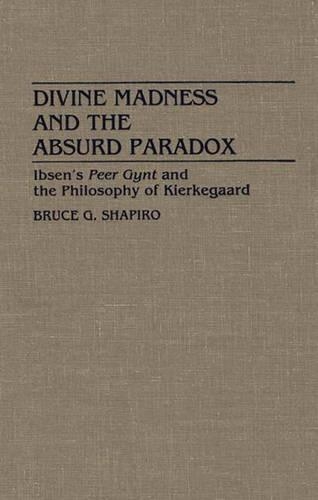
Divine Madness and the Absurd Paradox: Ibsen's Peer Gynt and the Philosophy of Kierkegaard
(Hardback)
Publishing Details
Divine Madness and the Absurd Paradox: Ibsen's Peer Gynt and the Philosophy of Kierkegaard
By (Author) Bruce G. Shapiro
Bloomsbury Publishing PLC
Praeger Publishers Inc
23rd May 1990
United States
Classifications
Tertiary Education
Non Fiction
Literary studies: c 1800 to c 1900
Literary theory
839.8226
Physical Properties
Hardback
272
Description
This book is a comprehensive study of Peer Gynt, a drama that forms the foundation of not only the entire Ibsen canon but also modern drama as a whole. It provides scene-by-scene commentary on the drama, showing how the literature and ideas of the drama resemble, and sometimes duplicate, the literature and philosophy of Soren Kierkegaard. It is the first such study since Henri Logeman's commentary on the drama published in 1917. Although the main focus of the book is Ibsen's drama, Bruce Shapiro's study provides some substantial insights into Kierkegaard. He demonstrates how Ibsen's poem was influenced by Kierkegaard's philosophy and literature. One of the most perplexing questions about Peer Gynt is how the ending of the drama functions as a resolution to the whole. This study formulates an understanding, based upon Kierkegaardian philosophy, that accounts for this scene. Moreover, the revelation of Kierkegaard's influence on Ibsen allows the contemporary reader to experience the essence of the drama within the same intellectual context in which it made its first literary appearance. When Kierkegaard's philosophy is artistically brought back into existence through a reader's experience of Peer Gynt, it is as if that reader is a contemporary of those very thoughts. With Kierkegaardian philosophy as the common horizon of understanding, Peer Gynt may be perceived as a complete and unified drama from its beginning to its conclusion. Shapiro's book is the first comprehensive study of Peer Gynt to be published. It may also be the first study to demonstrate one way in which the entire Kierkegaardian dialetic was understood during the philosopher's lifetime. This unique work will be a valuable book for scholars and students of drama, Scandinavian studies, modern philosophy, and existentialism.
Reviews
"Bruce Shapiro has provided a stimulating and provacative close reading of Peer Gynt. . . . The valuable insights . . .will make the book required reading for anyone who wishes to make sense of Peer Gynt --actors and directors as well as scholars and critics."-Lawrence Senelick Fletcher Professor of Drama, Tufts University
"Shapiro has compacted the mass of critical writing on Peer Gynt. . . . Chapter headings are tantalizingly inviting. And one is rewarded by the specific analysis of the texts. Substantial and interesting in itself and very helpful (perhaps crucial) for the comprehension of Peer Gynt."-Dr. Howard V. Hong Translator and General Editor, Kierkegaard Writings; Director, Kierkegaard Library, St. Olaf College
"Shapiro writes in a clear and smooth style, enriched by his treatment of metaphors such as that of photography, which he finds in the play but expands upon to show its significance for our times."-Carla Waal Professor of Theatre, University of Missouri-Columbia
Author Bio
BRUCE G. SHAPIRO is an artist-in-residence in acting and directing at Tufts University. He has presented papers at numerous conferences and has received grants from the National Endowment for the Humanities and the Council for the International Exchange of Scholars.
